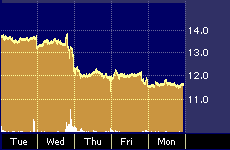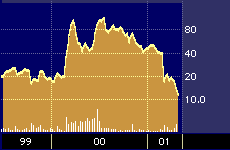
Rambus on the Ropes
Rambus on the Ropes
By Hal Plotkin
CNBC.com Silicon Valley Correspondent
May 15, 2001 02:00 PM
The wild ride for Rambus Inc. {RMBS} shareholders may finally be at an end.
A federal jury last week found the Los Altos, California-based memory chip design firm guilty of fraud for drafting memory chip patent claims based on information learned during confidential meetings of a key semiconductor industry standards setting body. Rambus was ordered to pay $3.5 million in punitive damages as a consequence of its dispute with German semiconductor maker Infineon Technologies AG {IFX}.
Officials at Rambus immediately announced they would appeal the ruling and also say they will intensify their efforts to boost sales of Rambus’s own proprietary memory chips. The company is also involved in several other related patent disputes with other semiconductor manufacturers.
But most analysts agree that if the latest ruling stands it will put an end to investor hopes that Rambus will be able to derive substantial income by cornering the market on critical memory chip technology patents. Rambus had hoped to use royalty payments from patents on two types of currently available memory chips not only to generate revenues but also as a lever to drive manufacturers toward Rambus’ own proprietary flavor of next-generation memory chips, called RDRAM.
Several firms, including Hitachi Ltd. {HIT}, NEC Corp. {NIPNY}, Samsung Corp. {SSGQF}, and Toshiba Corp. {TOSBF}, had already agreed to make payments to Rambus in connection with the disputed patents.
“I expect the existing licensees will renege on their contracts,” says Ashok Kumar, an analyst at U.S. Bancorp Piper Jaffray, based in San Francisco. “Without enforceable patents, the earnings power of the company collapses. The segment was expected to contribute three-quarters of their top line [revenues].”

Rambus Inc. 5-day stock performance
Rambus investors, who have taken quite a beating in recent months, reacted with surprising equanimity to last week’s news. The stock sold off lower on Thursday and Friday, but buyer interest limited the damage, at least for the time being.
“I don’t know what the reasons could be for the buyers,” says Brian Matas, vice president at IC Insights Inc., a semiconductor market research firm based in Scottsdale, Arizona. “There’s no reason to look at this company and believe its got a future that would be beneficial to investors.”

Rambus Inc. 2-year stock performance
Rambus’s stock has been a poster-boy for the market’s unprecedented volatility over the past two years. The stock gave shareholders a roller coaster ride as cycles of investor optimism waxed and waned over whether Rambus’ patents would provide the company with a long-lasting and virtually expense-free high-margin income stream based on royalty payments from computer makers.
Prior to last week’s ruling and other recent adverse developments the company’s legion of true believers, many of whom are very active in online stock chat rooms, maintained that Rambus had a legal and technical hammerlock on the memory chip market going forward.
Roughly two years ago, for example, Seth Dickson, then-semiconductor analyst at UBS Warburg, slapped a “strong buy” rating and a $350 price target on the stock, which at the time was trading in the $170 range.
“The best thing Rambus has going for it is the unwavering support of Intel,” Dickson reiterated last year. “That’s why I own Rambus stock and put more of it in my IRA every month.”
What a difference a year makes. Shortly after Dickson made that comment Intel backed away from its previously planned exclusive reliance on Rambus designs for future PC models, which sent the stock into a tailspin. Dickson has since left UBS Warburg, which has dropped coverage of the stock.
The three other analysts formerly following Rambus have also apparently dropped coverage of the stock according to Zack’s Investment Research, which lists no current analyst recommendations on the security.
Ironically, the lawsuit began as a patent infringement case brought by Rambus against Infineon alleging violations of Rambus patents on two types of memory chips. Those claims were thrown out, but an Infinion counter suit alleging fraud by Rambus found favor with the jury.
“The only consolation for the company was that it was not found to have violated U.S. anti-racketeering laws,” says Richard Gordon, principal semiconductor memories analyst at Gartner, based in Lowell, Massachusetts.
“The innovations at issue are Rambus inventions, and the evidence presented at trial made it clear that Infineon knew all along that they were Rambus inventions,” countered Geoff Tate, Rambus CEO, in a statement released in response to the jury’s verdict.
Rambus also conducted a conference call with analysts on Friday with much of the discussion focusing on Rambus’s plan to build its business going forward by increasing sales of its own proprietary RDRAM memory chip, which has been slow to catch on.
“The company is doing the only thing they can do, which is to try to turn the story around again,” says Drew Peck, an analyst at S.G. Cowen Securities, based in Boston. “They were going to collect royalties on all memory [chips] in part because they were losing ground when the Rambus memory wasn’t being accepted. Now they’ve gone back to the the first plan, which is to sell more Rambus memory.”
Peck is among the legion of analysts who don’t think either plan will work.
“Rambus has a serious problem to try to convince investors of the merits of either argument,” he says.
The anlysts say that in the past Rambus’s stock often moved up and down based on varying levels of excitement about the company’s legal claims and threats of courtroom action. In the future, they say Rambus will increasingly be judged by what goes on in the marketplace rather than the courts.
“My guess is that this [the legal case] will linger for a long time but I don’t think that investors will bite again until Rambus shows that it can capture a significant amount of the memory market with their own technology,” says Peck.
On a larger note, some experts fret about the damage the Rambus case may have done to the work of critical semiconductor industry standards setting bodies. Standards are critically important in the high-tech world because they create a common platform that allows inter-operability of devices and encourage competition between manufacturers.
“There is bound to be a loss of confidence in the ability of companies to work collectively to produce industry standards and this can only retard future semiconductor development,” says Gordon, of Gartner.
“Knowingly or not, Rambus has done a great job of undermining the credibility of one of the main sources of competition in the intellectual property market, the standards bodies,” he says.
Officials at Rambus dispute that characterization and say the health of the high-tech industry depends on the enforcement of valid intellectual property claims.
“We will vigorously defend our patent rights against any company that attempts to use our innovations without compensation,” said Rambus CEO Tate, who vows an aggressive appeal of the jury’s verdict.


